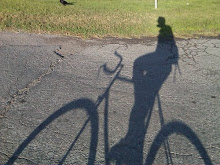An article in the Mother Nature Network by Ken Edelstein got me thinking about this subject. Even so called "Green" media outlets such as Treehugger and EcoGeek, when covering a topic such as transportation, usually discuss the latest hybrid or electric vehicle rather than the much more green option of not driving at all. Four out of seven of today's top articles in the transportation section of Treehugger are about cars. As Ken points out in his MNN article, stories about the latest in vehicular technologies provide a Wow factor that connects with American's love affair with the car
But I think it goes deeper than that and our current economic downturn can provide a little bit of insight. With the economic downturn everyone is suffering, not least of all the media industry and people don't like change. There is a big emphasis on the need for recovery and for things to get "back to normal." By normal I mean more cars sold, more vehicle miles traveled, more consumption, and a bigger than last year holiday sales season. Media outlets especially want this so that their advertising revenue can return to normal. I'm not claiming this is some conspiracy, it is just that people and media outlets perceive "back to normal" as being in their interest.
Thats why we have a government that wants us to go out and spend and a stimulus package that is designed to inject money back into the system. In Obama's opinion it is better to saddle us with debt so that we can spend now than it is to be frugal and let creative destruction take affect and reorganize our economic system. Its the same policy Bush put in place after the Dotcom bubble and 9/11; lower taxes, borrow more, and take out your credit cards and go to the mall.
Rather than learn lessons from my grandparents generation that had frugality and self reliance forced on them by the Great Depression, we are trying to spend our way out of the mess we created when we borrowed and spent too much in the first place. We are attempting to prop up an outdated economic system, one based on perpetual growth, consumption of ever more resources, and unlimited sprawl.
As Ken points out:
Even though repair backlogs can stretch years or decades into the future, nearly one-third of (stimulus)
money, $6.6 billion, went towards roadway new capacity projects. At a time when public
transportation ridership is hitting all-time highs and the budget crunch is causing transit agencies to cut
routes, service and jobs, an abysmal 0.9% was spent on public transportation. Only 2.8% percent was spent
on non-motorized projects (i.e., bike and pedestrian projects).
And that brings me back to our behavior. We can thrive on producing and consuming less because by doing so there is the potential to unleash previously locked up resources to create whole new business models, local economies, and industries. Economists for the longest time worried about the loss of union jobs in manufacturing because the jobs that replaced those lost usually payed less. William Travis in his book, New Geographies of the American West, cites two University of Montana economists, Thomas Powers and Richard Barret, who found that supporting such "old economy" industries such as manufacturing and resources extraction actually held back the Montana economy from developing faster and better allocating scarce resources of capital and labor. While manufacturing and union jobs have constantly declined since the '70s America is rich not poorer because of it.
Part of the problem is obviously design, as our cities, road networks, and economic connections are all designed to work toward moving vehicles, goods, and money through the system as fast as possible. Thats why the financial collapse happened. All of a sudden when a banks payment of a loan was held up by a second bank's inability to pay the first bank, the whole system came crashing down in a matter of days. Its the same with our cities, if we only connect communities with roads designed for cars, there will be no opportunity for a community to connect through walking and biking and that community will miss out on an opportunity to organize itself and social and economic activities around such activities
By changing behavior, i.e. consuming less, driving less, working less, we don't have to sacrifice our quality of life and can actually improve it while at the same time lessening our impact on the environment. Change can be a scary thing for many people because of the uncertainty that it fosters. But if people are serious about combating climate change and at the same time developing more resilient economies that offer opportunities for the future we have to focus on behavior and not just the technology.





1 comment:
Couldn't agree more. It won't be easy because you're poking at two of the most deeply ingrained beliefs of our culture: consumption as a lifestyle and hope for a technological salvation.
This time of year, you see this contradiction come to its peak. On the one hand, we want to slow down, spend time with family, maybe engage in some religious reflection, etc. Yet it's also the season to shop, shop, shop, do our duty to strengthen the economy. I saw a Walmart commercial that walked this line masterfully, claiming that because of their convenience you can buy lots of stuff and still have time with family. They chose a scene of a family reading together besides a fire on a couch (nothing you really need Walmart for) rather than the mom negotiating a traffic-clogged giant parking lot with boxes of plastic robots.
Post a Comment